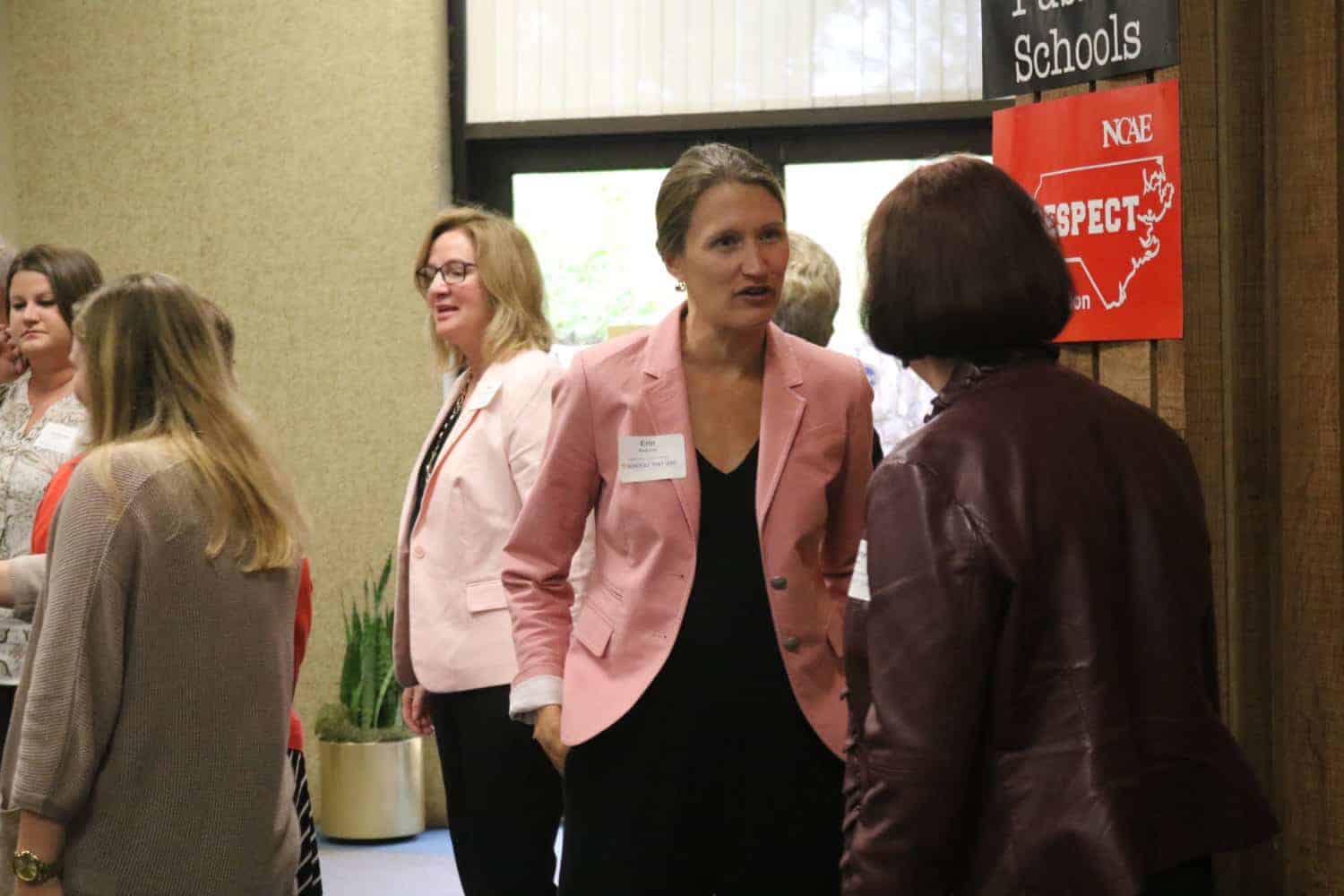Principals, teachers, and administrators from 36 schools across the state gathered in Raleigh Tuesday to start a three-year pilot program. With funds from the legislature, Schools That Lead, a nonprofit education organization that focuses on improvement science, will work with up to 60 North Carolina schools to raise graduation rates and better student outcomes.
According to the Carnegie Foundation for the Advancement of Teaching, which Schools That Lead partners with, “Improvement science deploys rapid tests of change to guide the development, revision and continued fine-tuning of new tools, processes, work roles and relationships.”
Sofi Frankowski, the organization’s chief learning officer, explained the process Tuesday to a room of educators as “getting better at getting better.”
The General Assembly allocated $350,000 in recurring funds to the organization during its 2018 short session. The participating schools saw three main goals the organization listed on an RFP (request for proposal) and volunteered to get involved: increase on-time graduation rates for high schools, reduce ninth-grade retentions for middle schools; and, for elementary schools, reduce the number of students with “early warning indicators” based on course failures, absences, and discipline.
Rep. Craig Horn, R-Union, opened the program’s launch, speaking of the importance of attracting and retaining high-quality educators and helping them advance their skills without leaving the classroom.
“We want to perform at the top of our profession,” Horn said. “That’s inherent in us, but we’ve allowed professional development to become nothing more than how to fill out another form, or to tell you about the newest mandate that we’re going to shove down your throat, and not pay you for it, not provide you supplies for it, not provide you anything, but you’ve got to do this. We’ve got to turn that corner and develop, establish, create, promote, be involved in true professional development.”
Horn said the legislature welcomed Schools That Lead to the state, “for that purpose, to improve our ability in the classroom, with the kids, and resulting in improved student outcomes, because that’s what we’re all about.”
Bertie County Schools Superintendent Catherine Edmonds said she heard of professional development based around improvement science and was immediately interested. Four out of 7 schools in Edmonds’s district are participating in the program. Edmonds previously worked at UNC General Administration, where she learned about improvement science. She said its implications are important for how principals lead schools.
“For me, I’ve been a principal, I’ve worked with principals, and what I’ve noticed is that there is a gap when you decide what you implement, how you determine that,” Edmonds said. “And everyone says, ‘research-based.’ What does that really mean to a principal? And how do I determine if this is the thing that needs to be in my school?”
Schools that Lead President and CEO Dana Diesel Wallace walked educators through a “driver diagram,” which each participating school will create. Each diagram has a main specific goal that has a time limit. The model lays out problems associated with that goal, and then breaks down those issues with ideas and strategies, sometimes directed at specific students.
Diesel Wallace said each school will go through multiple versions of the model and try multiple ideas. She said the goal is to track an idea’s impact and change the idea to reflect what students need, repeating a PDSA cycle: plan, do, study, act
“When you make up an idea, don’t abandon it because it didn’t work today or yesterday or a week from now,” Diesel Wallace said. “Get really smart. Why isn’t it working? Because you might have been this close, when you said, ‘I’m never doing that again,’ … We want you to stick with things using those PDSAs and some other tools to a point where you say, ‘Yeah, I understand why this isn’t working. I’ve learned something from that. Now I’m going to tweak or I’m going to try a different strategy.'”
The cohort, made up of both district and charter schools, is called a “networked improvement community.” Seventy percent of the students served at the schools are low-income. Sixteen are elementary schools, 11 are middle schools, seven are high schools, and one is an early college. Diesel Wallace emphasized the power of that support system.
“You’ll be able to share these ideas and see if it works in another context,” she said. “If it doesn’t, why didn’t it?”
Over the next three years, Schools That Lead staff will meet with teachers 14 times, principals 10 times, and “improvement facilitators” 10 times, along with hosting summer events for the entire cohort each year. Diesel Wallace said the program is about giving structure so that teachers and school leaders can be better equipped to define a problem and work towards solutions. What the problems and solutions are, she said, is up to the individual schools to decide.
“A lot of times, we tell people what they ought to do,” she said. “What we know is the people in this room and people back in your schools are the people who know what’s going on in your school, what’s getting in the way of kids being successful, and will figure out how to make kids successful.”



